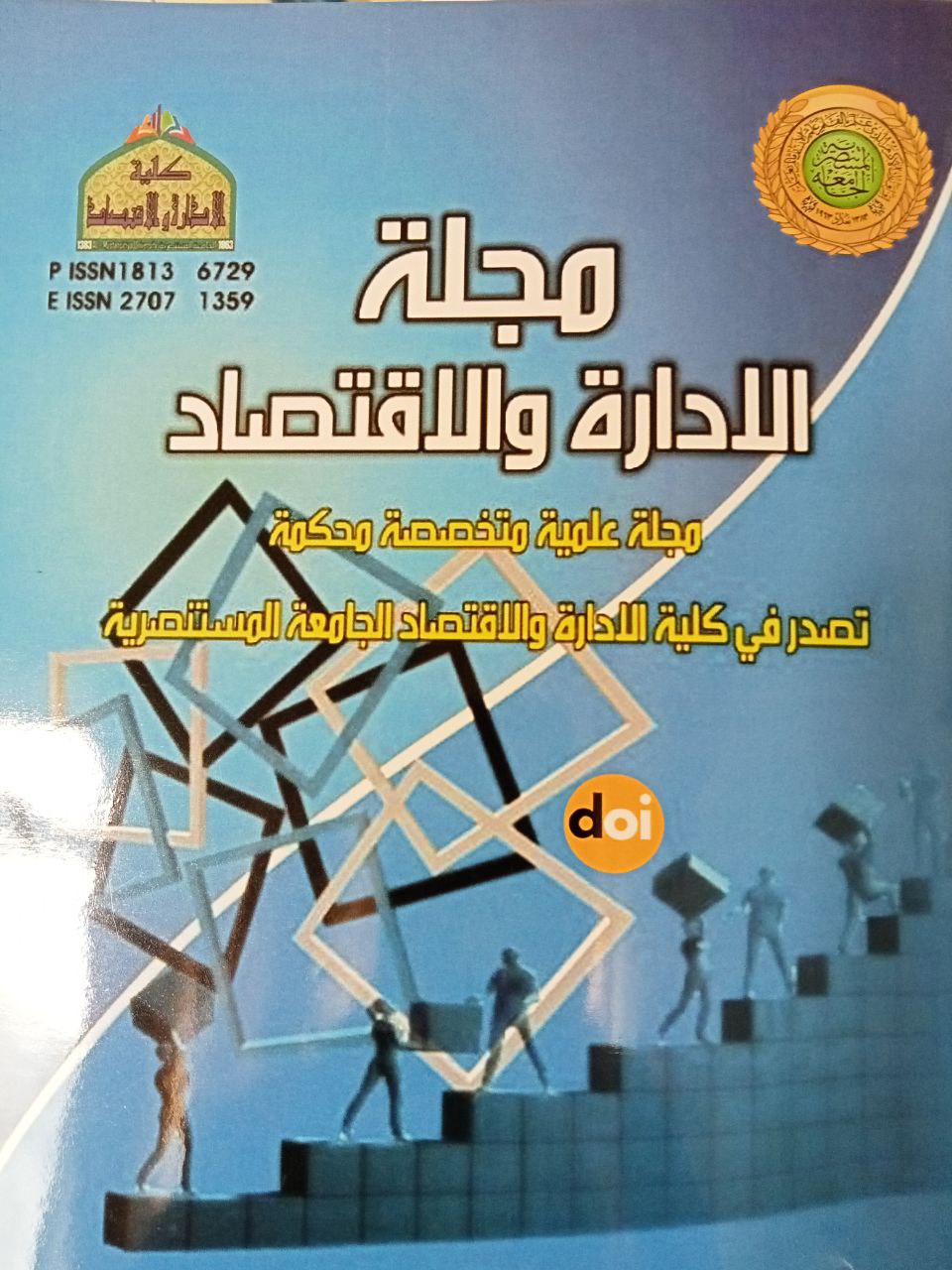سلوك اللاتهذيب في مكان العمل وانعكاساته على الدافعية للإنجاز: بحث تطبيقي على الجامعات الفلسطينية
DOI:
https://doi.org/10.31272/jae.i135.1162الكلمات المفتاحية:
سلوك اللاتهذيب، الدافعية للانجاز، الجامعات الفلسطينيةالملخص
يسعى هذا البحث للتعرف على مدى تفشي السلوك غير المهذب أو سلوك اللاتهذيب بين العاملين في الجامعات الفلسطينية، كما تهدف إلى الكشف عن مستوى الدافعية للإنجاز لديهم. بالإضافة إلى التعرف على العلاقة بين المتغيرين، وكذلك تأثير سلوك اللاتهذيب في مكان العمل على الدافعية للإنجاز.
وقد اتبع البحث لتحقيق أهدافه المنهج الوصفي التحليلي، وقد استهدفت عينة قوامها (359) مفردة من الموظفين العاملين في الجامعات الفلسطينية حيث تم توزيع الاستبانة عليهم. وقد توصل البحث إلى أن سلوك اللاتهذيب كان بمعدل منخفض جداً إذ لم يتجاوز (34.9%)، في حين كان مستوى الدافعية للإنجاز مرتفعاً (83%). كما تبين أن هنالك علاقة عكسية ذات دلالة إحصائية بين سلوك اللاتهذيب والدافعية للإنجاز، وقد وجد البحث أن هنالك تأثير عكسي دال احصائياً لجميع أبعاد سلوك اللاتهذيب في الدافعية للإنجاز.
التنزيلات
المراجع
7 القرآن الكريم.
7 السنة النبوية.
صحيح البخاري.
صحيح مسلم.
سنن أبو داوود.
7 المراجع العربية:
أبو الجديان، عبد الكريم (2020) دور الدافعية للإنجاز في تحسين الأداء الوظيفي: دراسة ميدانية – شركة الاتصالات الفلسطينية، رسالة ماجستير، الجامعة الإسلامية، فلسطين.
أبو السعود، سراج (2019) اللاتهذيب وأثره على الإنتاج، صحيفة الرأي السعودي، 27 فبراير 2019، متاح من الموقع: http://alqhat.com/beta/archives/140052 تاريخ النفاذ (25/05/2022).
أبو كاشف، جمال (1999) مفهوم الذات وعلاقته بالميول المهنية والدافعية للإنجاز لدى طلبة كليات المجتمع المتوسط في محافظة غزة، رسالة دكتوراة، جامعة عين شمس، القاهرة.
أحمد، أسامة (2020) تصنيف السلوكيات السامة المنحرفة في مكان العمل، مجلة الاقتصاد الإسلامي العالمية، العدد (96)، 71-138.
الأحمد، إقبال (2019) جرثومة اللاتهذيب، القبس الالكتروني، متاح من الموقع: https://alqabas.com/article/625832 تاريخ النفاذ (25/05/2022).
الأنصاري، عامر (2019) “منتدى عمان للموارد البشرية” يستعرض تحديات الموظفين وأسباب تراجع الأداء، (30/01/2019)، https://www.omandaily.om/?p=667517 (25/05/2022)
البريكي، فاطمة (2007) أثر الكلمة في حياتنا، صحيفة البيان (30/08/2007)، https://www.albayan.ae/opinions/2007-08-30-1.785083 (25/05/2022).
الجبوري، رياض (2022) اللاتهذيب ودور القيادة الرنانة في الحد من مظاهره: اختبار الدور الوسيط للمتلازمات الثقافية، رسالة دكتوراة، جامعة تكريت، العراق.
ربيع، محمد شحاتة (2009) المرجع في علم النفس التجريبي، دار المسرة، عمان: الأردن.
العابدي، علي و فايز، أكرم (2020) الفظاظة في مكان العمل وتأثيرها على الاحراق الوظيفي للعاملين: دراسة ميدانية في شركة نفط البصرة، مجلة معين، العدد (4)، 191-218.
عبد المقصود، أماني (2010) مقياس الدافع للإنجاز للأطفال والمراهقين: دليل المقياس، مكتبة الأنجلو المصرية، القاهرة.
عبوي، زيد منير (1999) الاتجاهات الحديثة في المنظمات الإدارية، دار الشروق للنشر والتوزيع، ط1: الأردن.
عثمان، كمال: صبحي، سيد؛ وشاهين، إيمان (2013) مقياس دافعية الإنجاز، مجلة القراءة والمعرفة، العدد (151)، 49-74.
عليلش، فلة (2016) الإيقاع الحيوي والدافعية للإنجاز لدى الطالب الجامعي: دراسة ميدانية على عينة من طلبة جامعة عبد الحميد بن باديس – ولاية مستغانم، (رسالة دكتوراة غير منشورة): جامعة وهران، الجزائر.
عوض، فتحية عبد الرؤوف (2009) مقياس الدافعية للإنجاز، الطبعة الثانية، وزارة التربية والتعليم، الكويت.
عياشي، عبد الله؛ حبى، عبد المالك؛ ولزعر، خيرة (2017) تقنين مقياس الدافعية للانجاز على طلبة الجامعات الجزائرية، مجلة العلوم النفسية والتربوية، 4(2)، (170-184).
قطامي، يوسف وقطامي، نايفة (2000) سيكولوجية التعلم الصفي، دار الشروق للنشر والتوزيع، عمان.
كشكوشة، نجوى (2011) تحليل المسار لعدم الالتزام في مكان العمل كمحدد للرضا الوظيفي، المجلة العلمية لقطاع كليات التجارة، ع (8)، 65-109.
لغزالي، صليحة وعايش، صباح (2021) مساهمة الدافعية للإنجاز واسترايتيجات التعلم المنظم ذاتياً في المردودية التحصيلية (التحصيل الأكاديمي) لدى طلب الجامعة- دراسة ميدانية بجامعة جيلالي بونعامة خميس مليانة، مجلة ألف – اللغة والإعلام والمجتمع، 8(2)، 187-207.
محمد، هشام قدري (2018) دور علم النفس في التدريب، المجلة العلمية للبحوث والدراسات التجارية، 32(1)، 277-343.
مطانس، سيرين (2017) الشعبية وعلاقتها بدافعية الإنجاز لدى الطلبة في مدارس التميز للموهوبين في قضاء عكا، رسالة ماجستير، جامعة عمان العربية، الأردن.
مواري، إدوارد (1988) الدافعية والانفعالات، (ترجمة: عبد العزيز، أحمد سلامة ونجاتي، محمد عثمان)، مكتبة أصول علم النفس الحديثة.
موسى، فاروق (2003). اختبار الدافع للإنجاز للأطفال والراشدين. جمهورية مصر العربية، القاهرة: مكتبة النهضة المصرية.
هادف، سومية (2018) الضغوط المهنية وعلاقتها بدافعية الإنجاز لدى عمال الصندوق الوطني للضمان الاجتماعي للعمال غيرالأجراء CASNOS–ام البواقي، رسالة ماجستير، جامعة العربي بن مهيدي، الجزائر.
اليوسف، رامي محمود (2016) الدافعية للإنجاز لدى طلبة الدراسات العليا في الجامعة الأردنية في ضوء عدد من المتغيرات، مجلة دراسات العلوم التربوية،45(2)، 360 – 374.
7: المراجع الأجنبية
Abid, Ghulam; Khan,Binish ; Rafiq, Zeeshan and Ahmed, Alia (2015) Workplace Incivility: Uncivil Activities, Antecedents, Consequences; and Level of Incivility, Science International (Lahore), 27(6),6307-6312.
Andersson, L. M., & Pearson, C. M. (1999). Tit for Tat? The Spiraling Effect of Incivility in the Workplace, Academy of Management Review, 24, 452-471. http://dx.doi.org/10.2307/259136
Chang, C., & Lyons, B. J. (2012). Not All Aggressions Are Created Equal: A Multifoci Approach to Workplace Aggression, Journal of Occupational Health Psychology, 17, 79-92. http://dx.doi.org/10.1037/a0026073
Cortina, L. M. (2008). Unseen injustice: Incivility as modern discrimination in organizations, Academy of Management Review, 33(1), 55-75.
Cortina, L. M., & Magley, V. J. (2009). Patterns and profiles of response to incivility in the workplace, Journal of occupational health psychology, 14(3), 272.
Cortina, L. M., Kabat-Farr, D., Leskinen, E. A., Huerta, M., & Magley, V. J. (2013). Selective incivility as modern discrimination in organizations evidence and impact, Journal of Management, 39(6), 1579-1605.
Donald, D, G Zauderer: (2002) Workplace Incivility and the Management of Human Capital. The Public Manager. Spring: 77-97.
Doshy, Priyanka and Wang, Jia (2014) Workplace Incivility: What Do Targets Say About It? American Journal of Management, 14(1-2), 30-42.
Estes, Brad and Wang, Jia (2008) Workplace Incivility: Impacts on Individual and Organizational Performance. Human Resource Development Review, 7(2), 218-240, DOI: 10.1177/1534484308315565
Ferguson, M. (2012). You cannot leave it at the office: Spillover and crossover of coworker incivility, Journal of Organizational Behavior, 33(4), 571-588.
Glendenning, P. M. (2001). Workplace bullying: Curing the cancer of the American workplace, Public Personnel Management, 30, 269-287.
Guilford, J. P. (1959). Personality. New York: McGraw-Hill.
Jiménez, Paul; Dunkl, Anita and Peißl, Sylvia (2015) Workplace Incivility and Its Effects on Value Congruence, Recovery-Stress-State and the Intention to Quit, Psychology, No. 6, (1930-1939) http://dx.doi.org/10.4236/psych.2015.614190
Johnson, P. R., & Indvik, J. (2001). Slings and arrows of rudeness: Incivility in the workplace, Journal of Management Development, 20(8), 705-714.
Kane, K., & Montgomery, K. (1998). A Framework for Understanding Dysempowerment in Organizations, Human Resource Management, 37, 263-275.
Laschinger, H., Leiter, M., Day, A., & Gilin, D. (2009). Workplace Empowerment, Incivility, and Burnout: Impact on Staff Nurse Recruitment and Retention Outcomes, Journal of Nursing Management, 17, 302-311.
Lim, S., Cortina, L. M., & Magley, V. J. (2008). Personal and Workgroup Incivility. Impact on Work and Health Outcomes, Journal of Applied Psychology, 93, 95-107. http://dx.doi.org/10.1037/0021-9010.93.1.95
Liu, Shen; Hong, Zijing; Zhou, Wei; Fang, Yingfen and Zhang, Lin (2021) Job-search self-efficacy and reemployment willingness among older adults: roles of achievement motivation and age, BMC Geriatrics, 21: 683 , https://doi.org/10.1186/s12877-021-02645-5
Miner‐Rubino, K., & Reed, W. D. (2010). Testing a moderated mediational model of workgroup incivility: The roles of organizational trust and group regard, Journal of Applied Social Psychology, 40(12), 3148-3168.
Pearson, C. M., Andersson, L. M., & Porath, C. L. (2000). Assessing and attacking workplace incivility, Organizational Dynamics, 29(2), 123-137.
Peters, Anya (2015) The concept of incivility: A case study, Teaching and Learning in Nursing, No. 10, (156–160)
Porath, C. L., & Erez, A. (2007). Does rudeness really matter? The effects of rudeness on task performance and helpfulness, Academy of Management Journal, 50(5), 1181-1197.
Porath, C., & Pearson, C. (2013). he Price of Incivility Lack of respect hurts morale—and the bottom line, Harvard business review, 91(1-2), 115-121.
Porath, Christine and Pearson, Christine (2012) Emotional and Behavioral Responses to Workplace Incivility and the Impact of Hierarchical Status, Journal of Applied Social Psychology, 42, S1, (E326–E357). doi: 10.1111/j.1559-1816.2012.01020.x
Reio, T. G., & Ghosh, R. (2009). Antecedents and outcomes of workplace incivility: Implications for human resource development research and practice, Human Resource Development Quarterly, 20 (3), 237-264.
Samian, Seger Handoyo; Syarifah, Dewi and Suhariadi, Fendy (2018) The measurement of workplace incivility in Indonesia: evidence and construct validity, Psychology Research and Behavior Management, No.11, 217–226.
Sliter, M., Sliter, K., & Jex, S. (2012). The employee as a punching bag: The effect of multiple sources of incivility on employee withdrawal behavior and sales performance, Journal of Organizational Behavior, 33(1), 121-139.
Smidt O., De Beer L.T., Brink L. & Leiter M. (2016). The validation of a workplace incivility scale within the South African banking industry, SA Journal of Industrial Psychology/SA Tydskrif vir Bedryfsielkunde ,42 (1), a1316. http://dx.doi.org/10.4102/sajip.v42i1.131
Strasser, P. B., Hutton, S., & Gates, D. (2008). Workplace incivility and productivity losses among direct care staff, AAOHN journal, 56(4), 168-175.
Tanjung, Immanuel Billy and Musa, Soebowo (2021) "The Impact of Achievement Motivation on Organizational Capabilities and Firm Performance in the Creative Industry Context," The South East Asian Journal of Management: 15(2), DOI: 10.21002/seam.v15i2.13602
Tarraf, Rima C., (2012) "Taking a Closer Look at Workplace Incivility: Dimensionality and Source Effects", Electronic Thesis and Dissertation Repository. 642. https://ir.lib.uwo.ca/etd/642
Tavakoli, Naghmeh; Hasanzadeh, Ramezan and Emadian, Seyedeh Olia (2022) Investigating the Mediating Role of Mind-Wandering between Achievement Motivation and Perceived Academic Stress in Nursing Students, Razavi International of Medicine, 10(1):e1068 doi: 10.30483/RIJM.2021.254224.
Taylor, S. G., Bedeian, A. G., & Kluemper, D. H. (2012). Linking workplace incivility to citizenship performance: The combined effects of affective commitment and conscientiousness, Journal of Organizational Behavior, 33(7), 878-893.
Yao, J., Lim, S., Guo, C. Y., Ou, A. Y., & Ng, J. W. X. (2022). Experienced incivility in the workplace: A meta-analytical review of its construct validity and nomological network, Journal of Applied Psychology, 107(2), 193-220. https://doi.org/10.1037/apl0000870

التنزيلات
منشور
إصدار
القسم
الرخصة
مجلة الإدارة والاقتصاد هي مجلة مفتوحة المصدر حيث تكون جميع محتوياتها مجانية. تخضع مقالات هذه المجلة لشروط ترخيص المشاع الإبداعي المنسوب إلى المؤلف (CC-BY 4.0) (https://creativecommons.org/licenses/by/4.0/legalcode) الذي يسمح للمرخص لهم دون قيود بالبحث عن النص الكامل للمقالات أو تنزيله أو مشاركته أو توزيعه أو طباعته أو ربطه به، وفحصه للفهرسة وإعادة إنتاج أي وسيلة للمقالات بشرط أن ينسبوا إلى المؤلفين الفضل في ذلك (الاستشهاد). تسمح المجلة للمؤلفين بالاحتفاظ بحقوق الطبع والنشر لمقالهم المنشور.
. Creative Commons-Attribution (BY)









